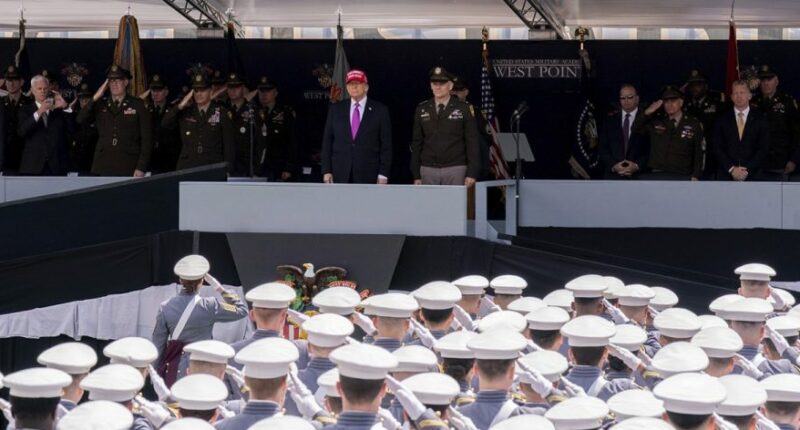Share this @internewscast.com
(The Hill) – The U.S. military academies are considering accepting scores from the Classic Learning Test (CLT) as an alternative to the SAT and ACT starting from the 2027 admissions cycle. This exam is particularly favored in conservative circles.
In the context of the Trump administration’s efforts to ban certain books and eliminate affirmative action at military academies, the Pentagon is exploring the inclusion of the CLT. Currently, this test is accepted by about 300 institutions, mostly small, private religious colleges.
Supporters claim the CLT, introduced in 2015, is needed to counter the dominance of the SAT and ACT. However, critics question the exam’s rigor and express concern about the limited historical data available to evaluate its effectiveness in gauging college readiness.

Bobby Jones, president of Veterans for Responsible Leadership and a former member of the Naval Academy’s admissions team, said, “Initially, it seems the CLT could help discover future officers who might be missed. But there are valid questions about its long-term impact.”
As reported by Politico, the Naval Academy, Coast Guard Academy, Merchant Marine Academy, and Air Force Academy plan to offer the CLT as an admissions option from October 1. This aligns with a goal set by Defense Secretary Pete Hegseth earlier this year.
Hegseth stated, “We’re going to make this happen, James. The CLT is the gold standard, and our academies need to attract the very best,” in a message to a social media user in May.
A spokesperson for the Pentagon previously told The Hill that it did not have any updates on the matter to announce.
Jones says his main concerns with the CLT are its lack of data to prove it can indicate college readiness, the organization’s for-profit status, its conservative reputation and its potential usage as a litmus test for future military officers.
“The fact that it’s administered by a for-profit organization, which means there are things as far as biases, or the test being able to shift focus based on what is profitable” are troubling, Jones said.
He added that the CLT’s popularity among conservatives could also give academies an idea of the “political, ideological mint” of a particular applicant.
“The things that the Department of Defense are doing to try to create officers in a certain political mindset, since the Trump administration has come in, it’s disturbing,” he added.
The CLT’s first big break came in Florida in 2023 when the state’s Board of Governors approved it for all public university admissions.
CLT founder Jeremy Tate told The Hill he has been working to get the CLT in more universities, saying Ivy Leagues have been the least receptive.
The exam, he says, is an alternative to the “monopoly” the College Board and the ACT have on college readiness that also focuses more on “traditional” values and historical and religious texts.
“The SAT and ACT is a lot of very shallow passages. They weren’t necessarily passages that were worthy of a student’s time or attention. It’s important to put students in front of really the timeless kinds of text that have shaped the west,” Tate said.
“We’ve been pretty clear that we think Western civilization is a pretty awesome thing … and so that is viewed as polarizing with a lot of the elite colleges in America,” he added.
Not all states that have considered adopting the CLT have gone through with it.
The Iowa Board of Regents released a review of the CLT in 2024 where it found no peer-reviewed studies vouching for the test’s ability to predict student outcomes and that the test should not be used as a placement measure for students.
The results led the state away from adopting the exam.
A spokesperson for the ACT told The Hill, “We urge students, parents, and counselors to look carefully at whatever test they are considering to ensure that it is widely trusted to measure what it claims and is recognized as a reliable indicator of college readiness. The ACT is accepted at colleges across the world, including state flagship universities.”
Priscilla Rodriguez, senior vice president for College Readiness Assessments at the College Board, highlighted the 100-year history of the SAT and 60-year history of the ACT in showing how standardized tests meet requirements that are accepted around the world.
“There’s a number of industry standard analyzes, research reports and third-party verifications that have long existed to make sure tests like the SAT or ACT — the other college entrance exam, not run by us, different organization — these two tests have been able to show they test the right things, reliably over time, predict success in college so that colleges can trust the test and students can trust it, too. They can trust that it’s measuring the right things reliably,” Rodriguez said.
“If the purpose is to decide who gets into college, because we want them to succeed when they get there, does it have the necessary predictive validity to say our scores have a relationship to ultimate college success? Those are two broad areas — industry-standard, long-developed — and it is, again … neither of which have been really adequately or at all published by CLT,” she added.
Proponents of the CLT argue one of the upsides is that it revives the conversation of what these exams should really be testing and focusing on in schools and how success for the future is determined.
“I think the issue is not just where the College Board is setting the bar for what they think colleges need. I think the question is, what do we want students to learn and be prepared to do? And I think not enough schools around the country are asking students to learn Latin, for example, or asking them to study books at all,” said Jonathan Butcher, the Will Skillman senior research fellow in education policy at the Heritage Foundation.
“The Classical Learning Tests implies that this kind of classical instruction is what students are being taught in order to prepare for this test, and that classic books is at the centerpiece of that,” he added. “All of that to say is that I think that the question shouldn’t be ‘Are we training kids to get to college?’ … Now the question is, ‘What do we want them to do, be able to do, objectively?’”













